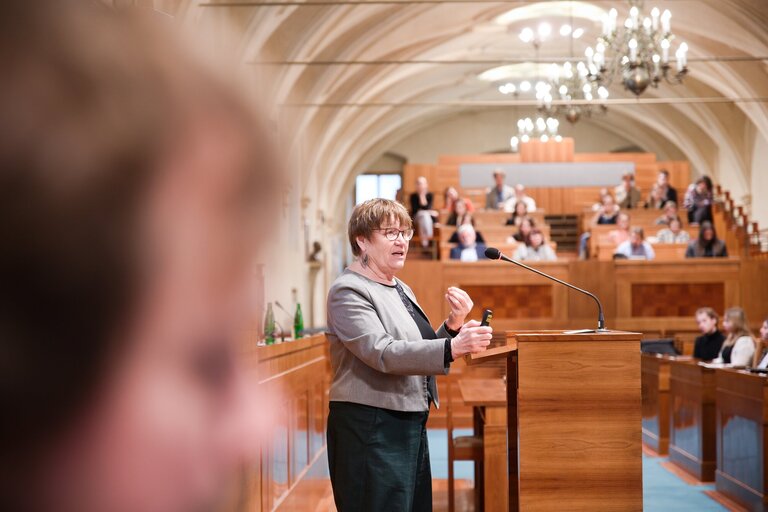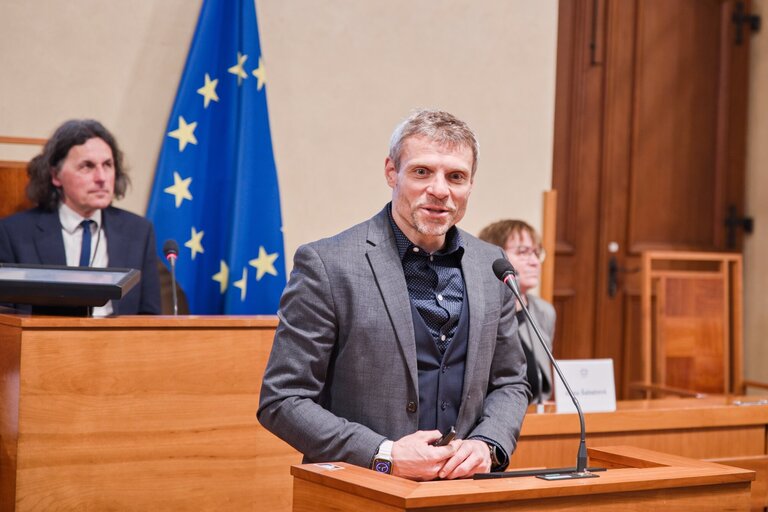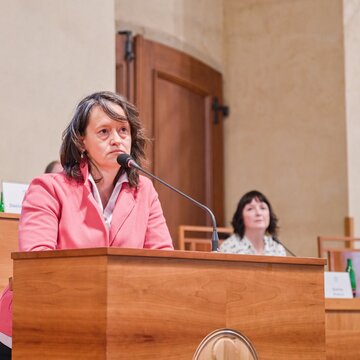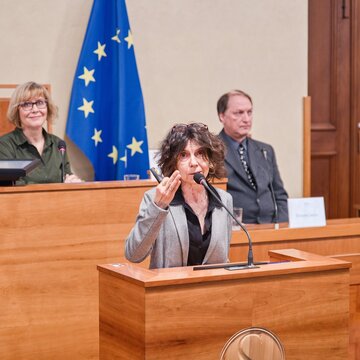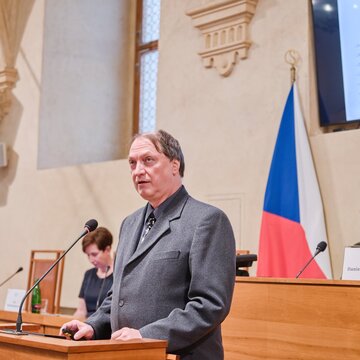Conference on the topic of dignity in crisis situations
On Tuesday, 25 March 2025, the Evangelical Church of Czech Brethren held its fourth annual interdisciplinary conference at the Senate of the Parliament of the Czech Republic. This year the theme was "Dignity in crisis situations or when we lose ground".
The meeting was held as part of the International Days Against Racism, which the Evangelical Church is introducing to the Czech Republic. The conference was held under the auspices of Senate President Miloš Vystrčil. This time, the discussion focused on human dignity in crisis situations.
"The topic of human rights and human dignity attracts and occupies us for a long time, because it is related to the meaning and quality of life, to mutual relations and coexistence on the planet. Human dignity belongs equally to every human being. This year's seminar will deal with how human dignity is transformed under the pressure of crisis situations," said Pavel Pokorný, senior synod leader of the Evangelical Church of Czech Brethren on behalf of the organizers.
Miloš Vystrčil took the floor at the beginning and greeted the participants and thanked them for the interesting initiative. "Human dignity is inalienable, innate and we must never give it up. And I thank you for dedicating yourself to it and for reminding us of it on the Senate floor," he said.
A Ukrainian minister, a surgeon and an ombudswoman offered their own perspectives on human dignity
After the introductions, the first morning block of lectures began. The first speaker was Pavlo Shvarts, Bishop of the German Evangelical Lutheran Church in Ukraine (GELCU), who gave the attendees an experience of how the war affects the life of this Protestant church and its members. Most GELCU congregations are located in the east of the country, the area most affected by the fighting. The dignity of people affected by human aggression is shattered on many levels, whether it is violence, material hardship, loss of home, hunger, lack of sanitation or the need to relocate to unfamiliar surroundings. Even though the GELCU is a small church (3000 members in total), it tries to be active and offer help. For example, it regularly provides food parcels, material assistance, pastoral care, but also psychological support and human closeness to those in need. "We have come to understand how important the role of the church community is. If a person is involved in a community, it helps him or her get through a difficult time in life more easily," Shvarts said.
Anna Šabatová, a signatory and former spokesperson for Charter 77, historian and politician, who served as Public Defender of Rights (Ombudswoman of the Czech Republic) from 2014 to 2020, spoke about the human rights situation in the Czech environment. She outlined how the system of human rights protection in Czech society was established. Dignity was a key concept. Although the roots of human rights principles in Czech society go back deep into the history of European civilisations, it took until relatively recently before human rights protection could be institutionalised. Nevertheless, even today there are cases where the integrity of human beings is violated. It was not until 2022, for example, that the last of the so-called cage beds, where troubled patients used to be placed, ceased to be used in healthcare institutions. Baby orphanages were even only abolished as recently as January this year. "It is important to remember that some things change and improve over time. There was a revolution in Czechoslovakia in 1989, but it was primarily a political revolution. It did not affect many areas of human life. It was only gradually that various systems began to change, such as the care of vulnerable children. It is interesting how much these things are related to culture and the way society thinks," she outlined.
The last speaker in the morning session was Tomáš Šebek, surgeon, entrepreneur and innovator in the field of digital healthcare. As a member of Doctors Without Borders, he has worked on missions in Haiti, as well as in war-torn Afghanistan, South Sudan and Yemen. He presented some stories from these missions, but also, for example, his experience of the situations in which Doctors Without Borders must be able to cope. "The motto, which I borrowed from a textbook of British trauma surgeons, says: if you have to cut, cut - and don't talk. I have used it today because I think we may sometimes talk more about values such as freedom, dignity, resilience and so on in our latitudes, but we are less aware that those values do not arise on their own and will not continue to exist unless there is some activity alongside the talking," he said.
Over fifty contestants entered the student literary competition
A traditional part of the day-long conference at the Senate is also the announcement of the results of the student literary competition. From mid-January to the end of February this year, students aged ten to 21 from all over the Czech Republic and Ukraine submitted their reflections and essays, in which they also reflected on the topic of dignity.
In total, 51 texts were received in Czech or Ukrainian. Diverse in their ideas and themes, the works dealt with the issues of homelessness, physical disability or psychological difficulties. The situation in Ukraine, which has been facing an armed invasion by the Russian Federation for three years, also resonated strongly.
The expert jury selected the 13 best works from the submissions, which were announced during the conference. The judges included, as last year, professionals from the editorial and editorial circle of the publishing house Albatros Media, whose foundation is the organizing partner of the competition. People from the headquarters of the Evangelical Church of Czech Brethren - Jiří Hofman (press spokesman, journalist), Helena Wernischová (educator, coordinator of EA schools), Adéla Rozbořilová (editor-in-chief of the magazine Český bratr, bohemist) and Mikuláš Vymětal (evangelical minister for minorities) - also took part in the evaluation. The Ukrainian reflections and essays were judged by selected coordinators working at ECCB community centres and congregations where they help Ukrainian refugees.
The evaluators agreed that it was not an easy task to choose the best works from such a high quality of submissions. "I was very pleased with the number of literary and mature works this year. In both categories, the works seemed to me to be qualitatively more equal, I did not find many distinct "outsiders" among them. It was very difficult to choose the three best works in both categories. That is why my colleagues and I finally decided to award one of the prizes to two of the contestants," said one of the jury members.
The award ceremony for the student literary competition was moderated by the director of the Central Church Office, Martin Balcar. The prizes were presented by Senate President Miloš Vystrčil and Synodal Senior Pavel Pokorný together with Bishop Pavel Shvarts and the director of the Albatros Foundation Jindra Marešová. The awardees received prizes in kind or financial rewards.
An important dimension of the conference is to offer students, especially primary and secondary school students, the opportunity to gain knowledge and inspiration from interesting actors in public life. That is why the organisers invite not only the students who took part in the literary competition, but also the pupils of schools founded by the Evangelical Church to the Wallenstein Palace every year. This year, 14 students from the Evangelical Gymnasium in Brno (Egy) and 31 students from the Evangelical Academy in Prague took part in the conference. The opportunity to visit the Upper House of Parliament is usually a rare opportunity for students. "The beautiful surroundings of the Wallenstein Palace and all the speakers made the day a really special experience," said, for example, the participants from Egy.
Different experiences, one dignity. "Seven Minutes" opened a glimpse into different worlds
This was followed by the final block of the programme. It featured five guests: the protestant minister from Krnov Štěpán Janča, the director and documentary filmmaker Nataša Dudinská, the psychologist of the Fire Rescue Corps Eva Biedermannová, the executive director of the Open Society Fund (OSF) Martina Břeňová and the director of the Centre for Humanitarian and Development Cooperation of the Diakonia of the ECCB Kinga Komorowska. Due to urgent work obligations, Czech Television reporter Tomáš Vlach excused himself from the panel discussion.
Each of the speakers first gave a brief presentation of their area of expertise in a "seven-minute" format, followed by a group discussion. Štěpán Janča recalled his experience with last year's floods, when he found himself cut off from the rest of the country by high water from one day to the next. Nataša Dudinska discussed the situation in the Middle East, especially in Israel. She recalled that the suffering and living in undignified conditions experienced by thousands of Palestinians in Gaza remains ignored by the media. Firefighter Eva Biedermannová recalled that crises are an inevitable part of life and must be taken into account. The OSF director pointed out that NGO workers have often had to fight prejudice or public disdain in recent times. Kinga Komorowska, whose Diakonia centre in North Moravia worked during the natural disaster and coordinated volunteers on the ground to help clean up the damage, also spoke about the floods. The debate was moderated by journalist Daniela Brůhová, who cooperates with Czech Radio, Czech Television and TV Noe.
Photo gallery from the conference in the Senate


